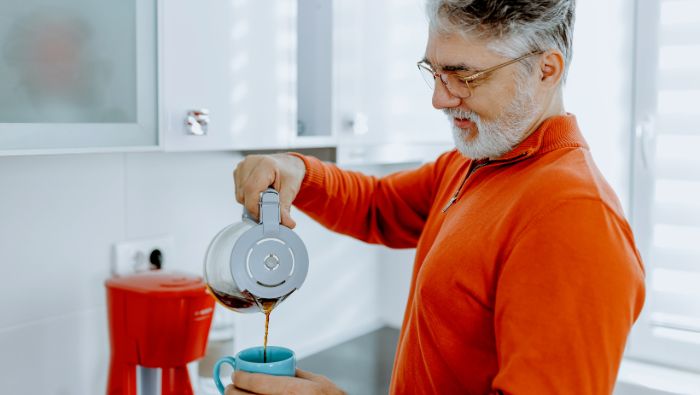4 Ways To Ruin a Great Cup of Coffee
by Rich Finzer

This article contains affiliate links. The Dollar Stretcher is an Amazon Associate and earns a small commission at no cost to you if you click on a link and make a purchase.
If there’s anything the average American will stand in line for, it’s a decent cup of coffee.
Coffee is expensive to buy and we don’t care. Coffee will stain your teeth or porcelain sink, and we don’t care. Some medical professionals insist that drinking coffee will ruin your health, and again, we don’t care.
Now, having said all that, why ruin your coffee, even before you have the chance to drink it? Well, apparently, many folks don’t seem to care about that either.
So, if you enjoy the robust taste of a cup of Joe, here are a few missteps to avoid.
1. Storing Your Coffee in the Freezer
For preserving meat or making ice, nothing beats using your freezer. And I apologize, but storing ground coffee in there can only be characterized as stupid.
Freezing robs moisture (can you say “freezer burn?”). So, by freezing coffee, you rob it of its aromatic oils. And those aromatic oils are what give coffee its wonderful taste.
You wouldn’t store freshly churned butter in a warm, sunny place in the hopes it will become rancid, right? So why perform essentially the same thing by freezing your freshly ground coffee?
Worse yet, because of coffee’s porous nature, while the freezer is stealing away the essential oils, your coffee may begin absorbing odors from the frozen salmon you stored it next to.
Sign Up for Savings
Subscribe to get money-saving content by email that can help you stretch your dollars further.
Twice each week, you'll receive articles and tips that can help you free up and keep more of your hard-earned money, even on the tightest of budgets.
We respect your privacy. Unsubscribe at any time.
2. Using Ground Versus Whole Bean
If comparing one to the other, whole bean coffee is the best option to purchase.
In the un-ground state, a coffee bean has significantly less surface area than the equivalent amount of ground. The reduced surface area resists drying out as quickly.
After you open the package, store any unused product in a dark-colored air-tight container, preserving those precious aromatic oils.
3. Grinding
By necessity, purchasing whole bean coffee means you’ll have to spring for a small countertop grinder. The units are not terribly expensive and will last for many years.
I purchased mine a few decades ago, and it still grinds beans like who laid the rails. Just keep it clean, but don’t wash it. Simply wipe the inside occasionally with a paper towel. And never grind more coffee than you intend to use that day.
If you’ve never ground coffee at home before, it may take a few days of experimentation before you determine the correct quantity of beans to use, but you’ll get the hang of it.
And here’s an interesting thought. Grinding coffee can present an unfortunate conundrum to a hangover sufferer. You’re in dire need of a cup of the stuff, but the sound of the machine operating may drive you to the brink of madness! So, if there is a genuine proviso against the overconsumption of adult beverages, this might be it.
4. Stocking Up
This strategy runs counter-intuitive to much of what Dollar Stretcher advocates, but there are exceptions to every rule.
Over time, even vacuum-sealed coffee begins to lose its flavor. Plainly stated, it gets stale. Now, if the grocery store is running a “BOGOF,” it’s fine to pick up a couple of deals. But don’t try to fill the pantry shelves with dozens of bags. The last ones you open won’t taste nearly as good as the first few.
You’re better off using coupons and saving a little on each purchase. The math works out about the same, and the object lesson here is to end up with decent-tasting coffee.
If saving money is your sole motivation, quit drinking coffee altogether.
By any definition, drinking coffee is one of the tiny luxuries we penny pinchers grant ourselves. So buy some, grind it up, and enjoy it.
Just don’t waste hard-earned money by ruining the stuff once you get it home.
Reviewed June 2025
About the Author
Rich Finzer resides in upstate New York. During his 40+ years as a writer, he has published over 1,200 newspaper, magazine and Internet articles. His books are available on Amazon: Maple On Tap: Making Your Own Maple Syrup, Taking the Tracks, Dawn Toward Daylight, and Julie & Me.
Popular Articles


